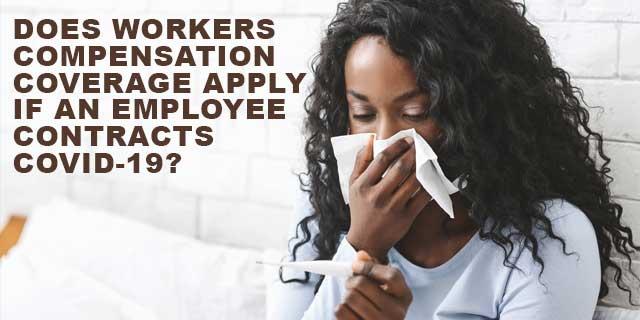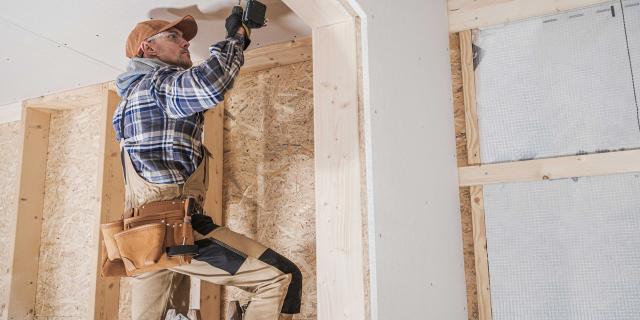ALL California employers must provide coverage for their California employees
Does Workers Compensation coverage apply to California businesses when an employee contracts COVID-19?

The JVRC Insurance team understands that COVID-19 has affected many businesses and given these unexpected circumstances business owners have several important questions. Questions such as, what do you do when one or more of your employee’s contracts COVID-19? How does this impact your workers comp policy and will coverage and or compensability be provided? These are all particularly vital and concerning questions to ask, and our goal here is to ensure that employers understand the ins and outs. In order to do so, we must discuss the presumptions bill SB 1159 and its purpose.
So, what is SB 1159 all about?
If the criteria listed below are met, the employee’s COVID-19 illness becomes an occupational injury which then becomes eligible for workers compensation benefits. Luckily for employers, this bill limits the risk of employers becoming liable for claims where the infection or illness did not occur at the place of employment.
This SB 1159 bill is an augmentation of the initial N-62-20 executive order which covered California employees COVID-19 illness or injury dating from March 19th through July 5, 2020. The SB 1159 bill addition addresses when an employee gets injured or sick due to COVID-19 on or after July 6, 2020. If SB 1159 deems you eligible for workers comp benefits, then this supersedes your workers comp policy’s compensable guidelines, and the claim should be covered.
The criteria below must be met …
- The employee tested positive for COVID-19 or was diagnosed with COVID-19 within a 14-day period after working for the employer.
- The employees place of work was not the employees’ home.
- The employee was diagnosed (not tested) and the diagnosis was provided by a physician who holds a surgeon and physician license issued by the California Medical Board and is confirmed with further testing 30 days after the diagnosis.
The SB 1159 bill also helps employers with 5 or more employees determine if there has been a COVID-19 outbreak within their place of employment as well. By exemplifying…
- If the employer has 100 employees or less and four employees test positive for COVID-19 within a fourteen-day calendar.
- If the employer has more than 100 employees and 4% of the employees test positive for COVID-19 in a fourteen-day calendar.
- If the place of employment is ordered to shut down by public authorities due to the risk of COVID-19.
With this new bill in place and as of September 17th, 2020, employers must inform their Worker’s Compensation carrier within three business days to report the test results in either writing, or via fax. This applies even if the employer does not believe the employee contracted COVID-19 through their place of employment. The carrier requires …
- An employee tested positive for COVID-19 (do not provide personal information unless the employee has filed a claim for workers compensation).
- The date of the test.
- The address of the employee’s places of employment.
- The highest number of employees that work at the place of employment.
Failure to report the required information or providing false information can lead to a civil fine of up to $10,000 for employers.
What benefits are employees entitled to under the SB 1159 bill?
- Supplemental Job Displacement Benefits: Help with pay for retraining or skill enhancement if the employee does not return to work for the employer.
- Temporary Disability Benefits: Injury prevents employee from doing job while recovering.
- Permanent Disability Benefits: Injury prevents employee from recovering completely.
- Medical Care: Medical treatment paid for by the employer.
- Death Benefits: Payment to dependents if employee dies from injury.
Can an employer dispute a COVID-19 Workers Compensation claim?
The employer may dispute the COVID-19 claim if the employer can prove that the illness or injury did not occur at the place of employment. The employer has 30 days to dispute the claim for the presumption bill regarding First Responders and Health Care Workers, and 45 days to dispute the claim for the Outbreak presumption.
The JVRC Insurance team understands that these unprecedented circumstances can be confusing and trying to understand the language for legislative bills such as SB 1159 is challenging. That is why we are here to help California business owners navigate through the constant changes concerning COVID-19 and workers compensation claims. If you have any questions regarding your current workers compensation policy and or employee’s worker compensation compensability and coverage in response to COVID-19, please reach out to our dedicated agency team or get a free online quote.
For more information, please read the bill at, https://leginfo.legislature.ca.gov/faces/billTextClient.xhtml?bill_id=201920200SB1159.
You can read the frequently asked questions regarding the bill at, https://www.dir.ca.gov/covid/employer/new-covid-laws.html.
Frequently Asked Questions about Business Insurance
Largely because of claims that occur, experience modifications, fraud and payroll amounts statewide
The Department of Insurance website, The WCIRB, The Insurance Journal and many other trusted sources
It’s a percentage that compares the payroll and loss history of your company to a similar-sized company within the same industry. For example, if a company has a better than average loss record, their experience modification would be less than 100%. If that is the case you would receive a credit on your Workers Comp rates. If that is not the case however it would result in the opposite, an increase in rates. The experience modification can be closely compared to an individual’s credit score.
It is illegal in the state of California to not carry it. There will be penalties, fines and many other consequences if a worker is injured and you do not carry it. Furthermore if there is a claim and you do not have California Workers Compensation Insurance at the time the employer is still liable for all costs relating to the injury which can be devastating to any company.
This is calculated based on your payroll, premium paid and by your reported losses for the last three consecutive years
The Department of Insurance regulates the laws and the State Senate makes them
It’s a component used determine the price an employer pays for their workers’ comp insurance premium. Classifications are established for each industry and typically include all jobs or operations within a particular business.






